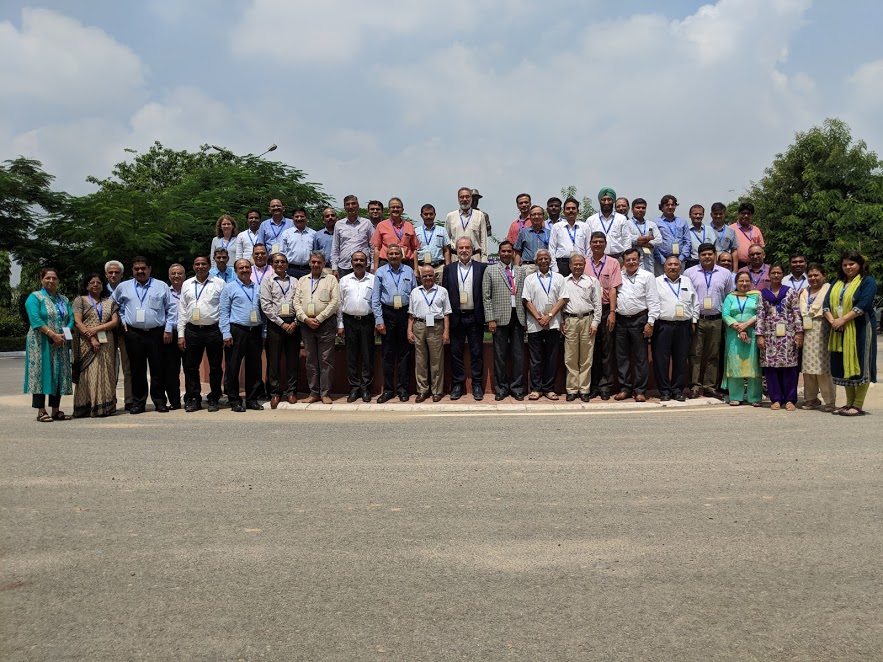Breeding for yield potential vis-à-vis biotic and abiotic stresses in wheat: Integrating genomics to move ahead
A brainstorming meeting on “Breeding for yield potential vis-à-vis biotic and abiotic stresses in wheat: Integrating genomics to move ahead” was organized jointly by CIMMYT and ICAR on Aug 21, 2018. The meeting took place in NASC Complex in New Delhi with a participation of around 50 delegates including the key officials of ICAR, Indian Institute of Wheat and Barley Research (IIWBR), State Universities and CIMMYT.
Dr. Trilochan Mohapatra, Secretary (DARE) and Director General, ICAR chaired the meeting with Dr. Hans J. Braun, Director, Global Wheat Program (GWP), CIMMYT and Dr. Anand Kumar Singh, Deputy Director General (Crop Science), ICAR.
Dr. Mohapatra expressed that there is a need to find a well-designed path to take advantage of the strengths of both CIMMYT and ICAR institutes. CIMMYT has a vast experience in germplasm enhancement globally which can be gainfully utilized by the Indian wheat program. Therefore, this meeting is to discuss critically how to take advantage of the expertise and experience of CIMMYT for the Indian wheat-breeding program. Dr. Mohapatra expressed his happiness that his challenge thrown to CIMMYT-BISA scientists on developing wheat variety capable of delivering 8-9 ton/ha yield potential is being realized. Some advanced lines in BISA farms have already shown yield potential up to 10 ton/ha which is a very encouraging development. Even if 80% of the potential is realized in farmers’ fields, it will be of immense value to the Indian agriculture. There is a further scope of using upcoming molecular tools which are already in use at CIMMYT’s research platforms. The Indian wheat program is also very rich in experience and can work shoulder to shoulder with CIMMYT-BISA scientists for further research enhancement leading to increased benefits to the society. Dr. Hans J. Braun, CIMMYT informed about the recent research developments in CIMMYT including research works being done in collaboration with stakeholders outside India. He also assured ICAR for a full support from CIMMYT.
The key agenda items that were discussed during the meeting included coherent strategy for organizing an ICAR-CIMMYT-BISA collaborative breeding program to develop climate resilient, disease resistant, high yielding varieties for different zones of India; efforts to be undertaken for localizing and taming wheat blast in Bangladesh to protect India and other neighboring countries; and developing a plan of action for medium to long-term capacity building programs for young Indian wheat scientists. Dr. Ravi P. Singh, Distinguished Scientist, CIMMYT spoke on the wheat breeding strategy for achieving 10t/ha yield potential in wheat. He presented the most recent data of wheat research being done using genomic selection approach in South Asia and its further augmentation in future. Dr. Pawan Singh, CIMMYT elaborated on the wheat blast issue which according to Dr. GP Singh, Director, IIWBR is of very high importance and needs to be tackled on priority.
The synthesis of the outcomes from the above discussions was presented by Dr. Hans J. Braun, Director, Global Wheat Program (GWP) along with inputs from Dr. Ravi P. Singh, Distinguished Scientist, CIMMYT, Dr. Arun K. Joshi, CIMMYT Asia Representative and Dr. GP Singh, Director, IIWBR. A very lively participation from all delegates led to a comprehensive discussion on different issues of the agenda.
The keynote deliberations and positive interactions between ICAR-IIWBR and CIMMYT scientists reflected the strong ties between the two institutes and reiterated their joint commitments.
Picture Courtesy: Vedachalam Dakshinamurthy
